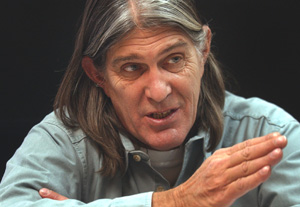O'Reilly misrepresents Ward Churchill, as he has from the beginning, but Top Dog Dr. Marc Lamont Hill has the facts"'Some people push back'--On the justice of roosting chickens" was written shortly after the events of 9/11, and from a perspective unfamiliar to most of us, that of a person of Native American heritage angry over historic events and injustices. I've read it and I get it, which doesn't necessarily mean I agree with it. But for those who have only heard the soundbites and Nazi-screaming, here's the relevant passage about the people in the WTC who were killed that day:
"They formed a technocratic corps at the very heart of America's global financial empire--the "mighty engine of profit" to which the military dimension of U.S. policy has always been enslaved--and they did so both willingly and knowingly. Recourse to "ignorance"--a derivative, after all, of the word "ignore"--counts as less than an excuse among this relatively well-educated elite. To the extent that any of them were unaware of the costs and consequences to others of what they were involved in--and in many cases excelling at--it was because of their absolute refusal to see. More likely, it was because they were too busy braying, incessantly and self-importantly, into their cell phones, arranging power lunches and stock transactions, each of which translated, conveniently out of sight, mind and smelling distance, into the starved and rotting flesh of infants. If there was a better, more effective, or in fact any other way of visiting some penalty befitting their participation upon the little Eichmanns inhabiting the sterile sanctuary of the twin towers, I'd really be interested in hearing about it."
Hill's correction of O'Reilly's misinterpretation was succinct and showed understanding of the root anger and frustration that bore this paper:
"When you look at his 'little Eichmann' comment, he was referring to Hannah Arendt, one of the great theorists of our time, and what she was saying is that oftentimes the big bad person that you think is this crazy killer's actually an ordinary technocrat, a person in a building who pushes buttons, who does things without any sort of sensibility of how bad they are. And he's saying that many times the people who were in that building may have been advancing an American global financial empire without any thinking about it. And I don't necessarily agree that we should be indifferent to their suffering--I happen to be a little more sympathetic to the victims and their families than Ward Churchill is, but he certainly had a valid point, number one, and number two, he has the right to say it and we have to defend it."Comment: For some of the original reactions to Churchill's essay, see
Terrorism: "Good" vs. "Evil".



Defend as he may, the author ought to realize that sometimes in life a person is just a creep, a bully and a fraud.
ReplyDeleteThat's Ward Churchill. Good riddance to bad rubbish.
Churchill isn't going anywhere for a while, I suspect.
ReplyDeleteHere's an article that criticizes the defense of Churchill's "little Eichmanns" remark:
http://blogs.rockymountainnews.com/denver/onpoint/archives/2007/07/carroll_the_real_eichmann.html
Eichmann was no mere foot soldier, mindless bureaucrat or technocrat, although that is what he wished the world to believe at his trial in Israel in 1961. Regrettably, the philosopher Hannah Arendt famously reinforced this interpretation—“the banality of evil” was her memorable phrase—in her writings of the time.
Yet such descriptions trivialize Eichmann’s contribution to the Final Solution, as well as Churchill’s invoking his name. Yes, Eichmann was a superb bureaucrat—tireless, efficient and thorough, keeping his head below the radar—but he was also much more.
Far from being a foot soldier, Eichmann was chief of the Gestapo’s Jewish office in charge of implementing the annihilation of an entire people. He was one of the few privileged Nazi insiders asked to attend the Wannsee Conference in 1942, which formalized the extermination policy and where he functioned as confidante to the vicious Reinhard Heydrich, who chaired the proceedings.